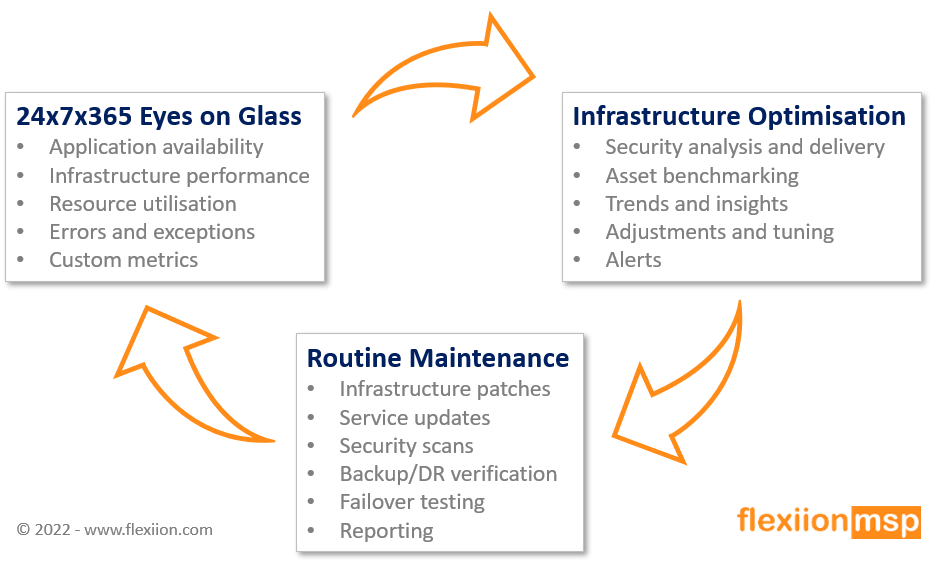Once online technology services have been built and tested, attention shifts to delivering to customer, and Operations becomes the name of the game. Lots of new workloads must kick in to ensure that performance is up to scratch, services are resilient and robust, and all service problems and issues are identified and fixed quickly to minimise disruption to customers.
 Yet the development team rarely has time to spare because they have to fix problems with the code that get revealed by being used at scale, and get on with adding new features, functionality and capabilities. Not only is there little unused capacity, but the mind-set of development teams isn’t well suited to the routine housekeeping that’s called for now the software is in service, and the disruption of responding to emergencies breaks the continuity and momentum of development.
Yet the development team rarely has time to spare because they have to fix problems with the code that get revealed by being used at scale, and get on with adding new features, functionality and capabilities. Not only is there little unused capacity, but the mind-set of development teams isn’t well suited to the routine housekeeping that’s called for now the software is in service, and the disruption of responding to emergencies breaks the continuity and momentum of development.
- Background housekeeping work on infrastructure is the poor relation and tends to get overlooked,
- Manning out-of-hours support cover is an unpleasant burden for dev teams already working hard on their delivery day job,
- Issues and emergencies drag devs away from their teams and disrupt development objectives and timelines.
With the rise of Cloud and the growing role it has to play in delivering services, firms looking for quality of service depend increasingly on dedicated cloud engineers able to field a mix of business and technical expertise to understand how a business works with its infrastructure, to provision servers and manage the cloud environment and services, sometimes across more than one cloud provider.
Cloud Operations people are proactive, not reactive; problems are solved before they occur: is a storage instance or computing node having performance issues or heading in that direction? CloudOps helps identify the problem before your customers do, and implement a fix or adjust the infrastructure ahead of it all going critical. What attacks have been logged? CloudOps examines the InfoSec systems to harden these and block the IP address. Cloud operations will automate this where that’s possible, alongside the diligent, manual watchfulness and interventions that can only be done personally.
Three different approaches can bring these skills and processes to bear to deliver effective and efficient Cloud Operations, and the right choice for any one firm will depend on many factors:
1. Bring in extra help to alleviate the pressure on the existing team
Dev teams sometimes want to retain all the technology related responsibilities, and this can be workable provided that a disciplined structure allocates the proper amount of time and attention to Operations so that it doesn’t get short-changed when other things get unusually urgent or interesting. The existing team can be extended with the relevant skills and required headcount, either on payroll full time, or as services from an external provider. This latter option is usually preferable, especially where requirement fluctuates and the payroll solution is too blunt and has insufficient flexibility. Tight availability of people with the right skills in the market can also make these hard and expensive to find, recruit and keep. A provider like Flexiion can deliver the right skill sets and people to augment the internal tech team.
2. Use an external team until the economics work to bring in-house
Some firms anticipate that their scale will eventually justify an internal team dedicated to Cloud Operations but aren’t there yet – the economics don’t yet support round the clock cover and the depth of skills required to deal with the range of issues and technologies involved in managing Cloud infrastructure. The right managed service provider like Flexiion, can bring all these skills and processes into play for you on a flexible basis to bridge your needs gap until you’ve scaled sufficiently to justify an internal team.
3. Shift non-core workload to a service provider
Many firms create value through the technology that they develop, not the time they spend on the equipment that runs it. Like a star chef whose creativity and skills lie in putting wonderful food in front of customers, and not in spending his valuable time cleaning and repairing the kitchen equipment. For these firms, time, effort and budget should be concentrated where it creates the most value, and non-core routine, like managing the Cloud equipment, shipped out to service providers like Flexiion who can do these things with better economies of scale and bigger teams than would be justifiable internally.
CloudOps – Cloud Infrastructure & Operations
These are the functions and capabilities that are needed to support Best-in-Class operational delivery of services in the Cloud to customers. Reliability, robust quality of service, and efficiency are the operational objectives. You need access to specialists in all the major Cloud brands and technologies, round the clock.
- System build and test – Procurement, deployment, configuration and test, documentation, acceptance test and handover
- Service support desk – 24x7x365 support response, ticketing and reporting, interactive issue management
- Network Operations Centre – Always-On vigilance, to monitor for faults, outages and capacity issues – 24x7x365 Eyes-on-Glass
- Service management – On-going, proactive work to improve performance and resilience, system optimisation, system patches and updates
- Rapid-Fix Response – The aim is to identify faults before they become customer issues, and fix them fast to maintain service levels

Peter is chairman of Flexiion and has a number of other business interests. (c) 2022, Peter Osborn